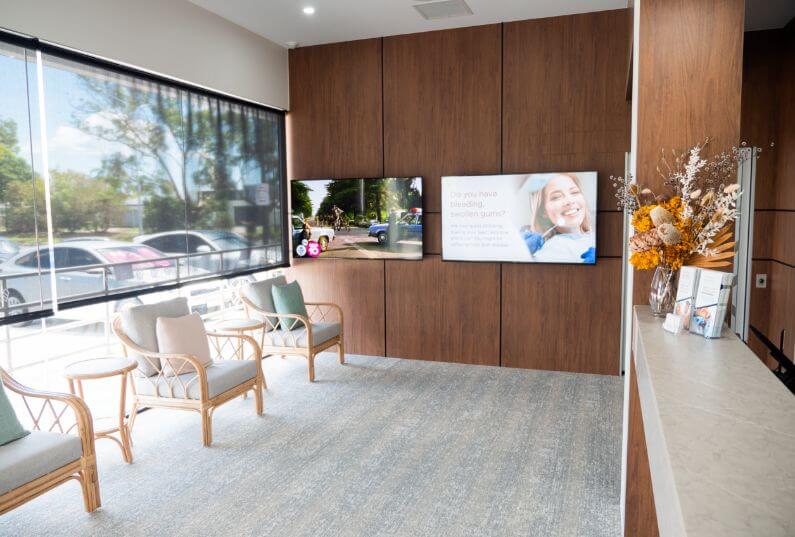For Patients
Knowledge Centre
Gingivitis
Gingivitis is a mild form of gum disease marked by inflamed and bleeding gums. Caused by poor oral hygiene and leading to more severe complications if untreated.
Periodontitis
(Gum Disease)
Many people are living with peritonitis simply because they do not know what it is. Periodontitis can be easily dedicated and treated by understanding and identifying the early signs.
Dental Implant
Diseases
Dental implants can be at risk of developing oral diseases such as peri-implant mucositis and peri-implantitis.
Dental
Implants
Defined as a screw-like titanium anchor that is used as an artificial replacement for natural tooth roots. Once the implant has fused to existing bone, it can then provide the structure for a prosthetic tooth.
Peri-
Implantitis
Pathological inflammation can arise around a load-bearing implant due to bacteria entering the gap between the abutment and the implant. This inflammation harms the surrounding soft and hard tissues.
Causes of Gum
Recession
Gum recession is a dental condition where gum tissue gradually recedes, exposing teeth to infection and decay. Untreated gum recession can lead to tooth sensitivity, aesthetic issues, bone loss, and potential tooth loss.

Payment and
Pricing Plans
Consultations cost $191.00 and include a review of your medical and dental history, an oral examination and radiographic imaging in our practice where possible. Occasionally we may need to refer you to other dental or medical providers as part of this process. In most cases, we’re able to provide a treatment plan at your initial consultation but occasionally we may need to bring you in for a follow-up appointment to present a more complex and detailed treatment plan.
Frequently Asked Questions
01. Do I need a referral to see a Periodontist?
To book an appointment without a referral, book online using our online booking system, or contact us at (07) 5651 7374.
02. How much will my treatment cost?
If you have private dental insurance, you may be entitled to some health fund rebates, depending on your plan. We offer a range of payment solutions that can help you with the financial aspect of your dental treatment. Please see Payment Plans for more information.
03. How does the Periodontist work with my General Dentist?
04. What can Periodontists do that my General Dentist cannot?
Periodontists can perform a variety of procedures, ranging from preventative to cosmetic to surgical. For more severe cases of gum disease that have resulted in loss of teeth, periodontists may perform dental implants, full mouth reconstruction, and/or bone grafts, whereas in less severe cases, a periodontist may perform milder procedures, such as periodontal maintenance or scale and root planing to halt or reverse the effects of gum disease.
Dr Anthony Puljich will work in partnership with your general dentist to develop a comprehensive care plan that is individualized to your unique oral health care needs.
05. How frequently should I schedule a periodontal examination?
Following your treatment at The Perio Specialists and Dental Implants, you will be provided a customised supportive/preventative care program. This care program includes a thorough gum and tooth assessment, a cleaning and/or debridement of teeth, and oral hygiene instructions.
For patients with a history of periodontitis and gum disease, it is recommended to be more closely monitored than usual. As such, you may be placed on a 3- or 4- monthly visit cycle. For dental implant patients, we usually recommend a yearly review in addition to your regular preventative care visits.
06. Will periodontal surgery be necessary?
07. Is periodontal disease contagious?
The bacteria that trigger this reaction are always present in your mouth, even in times of health. They are kept in check by other, healthier bacteria which are in greater proportions. Its until the biofilm evolves into a more pathogenic environment that the harmful bacteria takeover.
08. Is periodontal disease genetic?
09. What if I don’t address my gum disease?
Periodontitis is a progressive and harmful disease that causes destruction of the supporting tissues around your teeth. Over time, as these supporting structure shrink away, your teeth may become sensitive to cold and become loose or mobile during function, and you may develop black triangles and get food stuck between your teeth where the gums have shrunk away. As the disease progresses, the teeth may become non-function or extremely painful, which means they will need to be removed. This can compromise your ongoing oral health and function.
If you have been diagnosed with gum disease, or think you may be showing signs of gum disease, please book an appointment with our Periodontal specialist, Dr Anthony Puljich.
10. Where are you located?
Periodontitis is a progressive and harmful disease that causes destruction of the supporting tissues around your teeth. Over time, as these supporting structure shrink away, your teeth may become sensitive to cold and become loose or mobile during function, and you may develop black triangles and get food stuck between your teeth where the gums have shrunk away. As the disease progresses, the teeth may become non-function or extremely painful, which means they will need to be removed. This can compromise your ongoing oral health and function.
If you have been diagnosed with gum disease, or think you may be showing signs of gum disease, please book an appointment with our Periodontal specialist, Dr Anthony Puljich.
